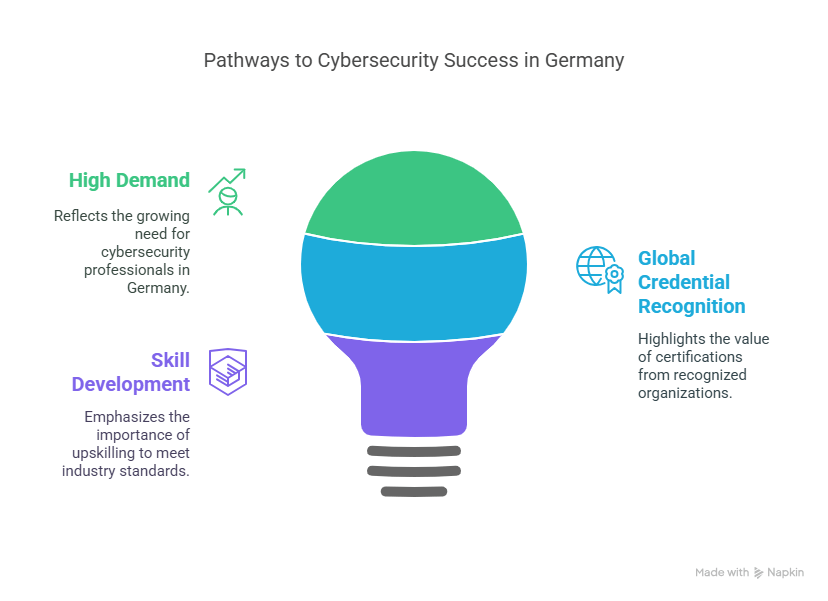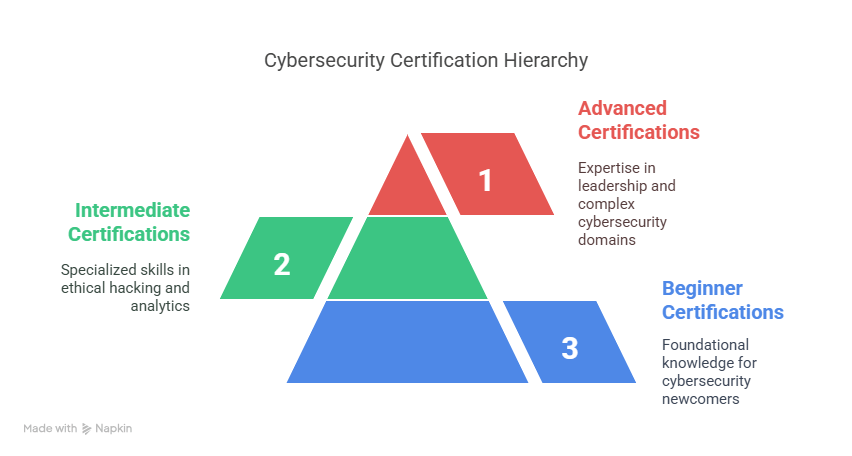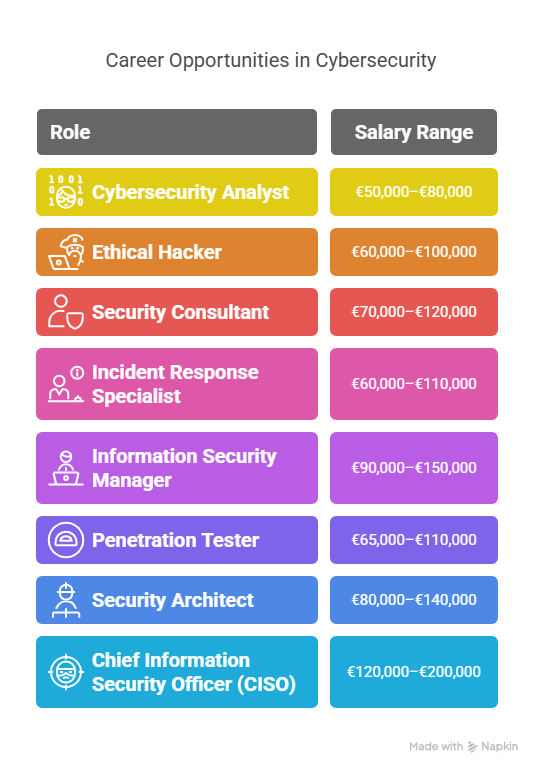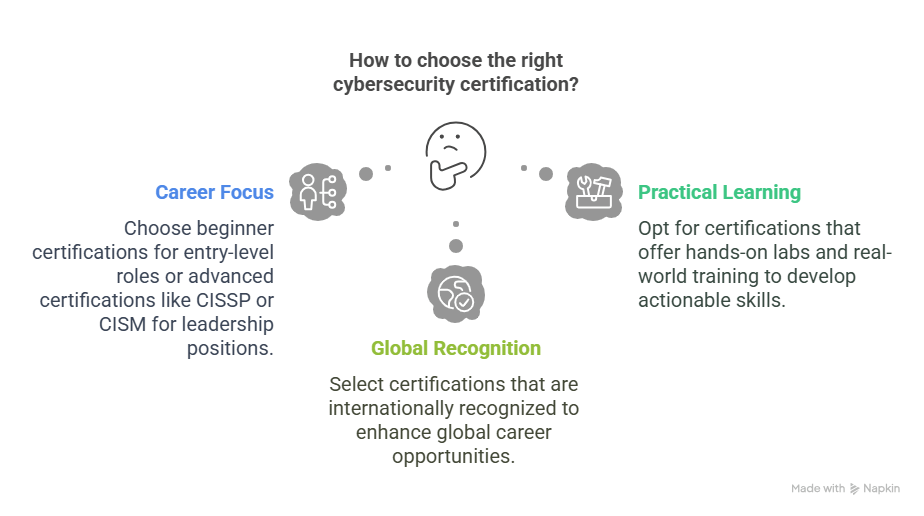Table of Contents
- Why Pursue Cybersecurity Certification in Germany?
- High Demand and Lucrative Career Opportunities
- Top Cybersecurity Certifications for Germany
- Career Opportunities in Germany After Cybersecurity Certification
- Why Certifications Matter for Cybersecurity Careers in Germany
- How to Choose the Right Certification Program
- ACSMI Cybersecurity Certification
- Final Thoughts
- FAQs on Cybersecurity Certification Germany
Germany is recognized as a global leader in technological innovation, making it a prime location for cybersecurity professionals. As industries increasingly rely on digital ecosystems and face rising cyber threats, the need for skilled professionals to safeguard critical infrastructure, businesses, and personal data continues to grow. Earning an It Specialist Cybersecurity Certification in Germany equips individuals with the technical expertise and credibility necessary to excel in one of the most competitive and rapidly evolving markets.
Whether you’re an IT professional seeking to specialize, an aspiring ethical hacker, or someone keen on transitioning to a cybersecurity career, obtaining a certification will position you for success. This guide highlights why pursuing a It Specialist Cybersecurity Certification in Germany is crucial, the top certifications available, and the potential career opportunities that come with it.
Why Pursue Cybersecurity Certification in Germany?
Germany’s emphasis on technological advancement, alongside its stringent data privacy laws like the General Data Protection Regulation (GDPR), has made cybersecurity expertise one of the most in-demand skills. Here's why obtaining a cybersecurity certification in Germany can set you apart:
High Demand and Lucrative Career Opportunities

Germany is home to some of the world's largest and most secure companies, including those in industries like finance, healthcare, and technology. However, with the increasing reliance on digital infrastructure, the demand for qualified cybersecurity professionals continues to outpace supply. Certified cybersecurity professionals enjoy higher salaries, quick career progression, and unique opportunities across global businesses and government agencies.
The cybersecurity job market in Germany offers competitive salaries and a range of roles, from entry-level positions to leadership roles, ensuring that certified professionals have ample opportunity to thrive.
Global Credential Recognition
Certifications from globally recognized organizations like ACSMI are widely accepted in Germany and abroad. These certifications not only validate your expertise in the local market but also enhance your global mobility, ensuring your skills remain relevant and portable across borders. If you plan to work internationally or are considering relocation opportunities, globally recognized credentials make it easier to find roles in cybersecurity across the world.
Cutting-edge Skill Development
Cybersecurity certifications are more than just a way to validate your knowledge—they also prepare you to tackle emerging threats. As cybersecurity becomes more complex, professionals are required to stay ahead of trends such as AI-driven attacks, ransomware, and IoT vulnerabilities. German organizations place a high value on professionals who are constantly upskilling. Certifications ensure you’re well-equipped to meet evolving industry standards and adapt to new security challenges.
Top Cybersecurity Certifications for Germany
Cybersecurity certifications in Germany cater to professionals at every stage of their career, whether you're just starting out or aiming for senior leadership roles. Below are the most recognized certifications based on experience level:

1. Beginner Certifications
Overview:
Beginner certifications are designed for those new to the IT or cybersecurity field. These certifications focus on foundational knowledge and introduce essential tools and techniques used in the industry.
Ideal For:
-
Fresh graduates
-
IT support staff transitioning into cybersecurity
-
Non-technical professionals seeking a career change
Focus Areas:
-
Basic network security
-
Incident handling and response
-
Security compliance
Recommended Certifications:
-
CompTIA Security+: This entry-level certification is widely recognized and covers foundational security concepts, network management, and risk management. It's an ideal starting point for anyone beginning a career in cybersecurity.
-
ACSMI Entry-Level Modules: These modules are specifically tailored for beginners, covering topics like network security, malware analysis, and foundational cybersecurity principles. These entry-level tracks provide practical hands-on experience.
2. Intermediate Certifications
Overview:
Intermediate-level certifications focus on more specialized skills, such as ethical hacking, penetration testing, and secure system development. These certifications require prior knowledge and hands-on experience in cybersecurity.
Ideal For:
-
Cybersecurity professionals or IT professionals looking to specialize further
-
Those already working in cybersecurity roles
Focus Areas:
-
Ethical hacking
-
Secure application development
-
Vulnerability management
Recommended Certifications:
-
Certified Ethical Hacker (CEH): This certification trains professionals in identifying and exploiting vulnerabilities in systems, making it a great fit for those interested in penetration testing and offensive security.
-
CompTIA CySA+: This certification focuses on cybersecurity analytics, offering expertise in proactive defense and intrusion analysis to combat evolving threats.
-
ACSMI Intermediate Programs: These cover advanced topics such as threat intelligence and vulnerability management. The programs help bridge skill gaps for professionals with existing technical backgrounds.
3. Advanced Certifications
Overview:
Advanced certifications are designed for seasoned professionals who want to take on leadership roles or specialize in more complex cybersecurity domains. These certifications validate expertise in strategic planning, risk management, and cybersecurity design.
Ideal For:
-
Experienced professionals aiming for leadership roles like CISO
-
Those specializing in advanced cybersecurity management
Focus Areas:
-
Information governance
-
Advanced penetration testing
-
Organizational security strategies
Recommended Certifications:
-
Certified Information Systems Security Professional (CISSP): CISSP is one of the most respected certifications for security professionals. It covers a broad range of security topics, including risk management, network security, and governance, making it ideal for those in managerial and executive roles.
-
Certified Information Security Manager (CISM): This certification focuses on managing information security programs and is ideal for professionals looking to move into management positions. It blends risk analysis with security management.
-
ACSMI Advanced Path: ACSMI offers advanced-level certifications that delve into areas such as AI security, risk assessment, and regulatory compliance, which are increasingly important in today's cybersecurity landscape.
Career Opportunities in Germany After Cybersecurity Certification
Obtaining a Cybersecurity Certification Test in Germany opens up a wealth of career opportunities across various industries, including banking, healthcare, manufacturing, and government. With Germany’s robust economy and focus on data protection, certified professionals are highly sought after. Below is a breakdown of some key roles and their potential rewards.

1. Cybersecurity Analyst
Role:
Cybersecurity Analysts are responsible for monitoring systems, analyzing threats, and creating strategies to protect an organization’s digital infrastructure from cyber risks.
Salary Range:
€50,000–€80,000 annually
2. Ethical Hacker
Role:
Ethical Hackers simulate cyberattacks to identify weaknesses in systems. Their job is to expose vulnerabilities before malicious hackers can exploit them.
Salary Range:
€60,000–€100,000 annually
3. Security Consultant
Role:
Security Consultants help organizations create customized cybersecurity strategies. They evaluate existing systems and offer advice on technologies and procedures to improve security.
Salary Range:
€70,000–€120,000 annually
4. Incident Response Specialist
Role:
Incident Response Specialists act swiftly to mitigate damage during a cyberattack, lead recovery efforts, and analyze incidents to improve future defense strategies.
Salary Range:
€60,000–€110,000 annually
5. Information Security Manager
Role:
Information Security Managers oversee an organization’s cybersecurity policies, manage teams, and ensure compliance with regulations such as GDPR.
Salary Range:
€90,000–€150,000 annually
6. Penetration Tester
Role:
Penetration Testers simulate cyberattacks to identify security weaknesses, document test results, and provide recommendations for improving cybersecurity measures.
Salary Range:
€65,000–€110,000 annually
7. Security Architect
Role:
Security Architects design and implement robust security infrastructures to defend against potential cyber threats. They ensure that systems are future-proof and aligned with the latest security standards.
Salary Range:
€80,000–€140,000 annually
8. Chief Information Security Officer (CISO)
Role:
CISOs are responsible for overseeing an organization’s entire cybersecurity strategy, ensuring all operations comply with regulations, and managing risk.
Salary Range:
€120,000–€200,000 annually
Why Certifications Matter for Cybersecurity Careers in Germany
Earning a cybersecurity certification not only validates your skills but also gives you a competitive edge in the highly competitive German job market. With cyber threats increasing, organizations are looking for professionals with the expertise and certifications needed to defend their systems effectively. Certified professionals enjoy better job prospects, higher salaries, and more career advancement opportunities, as certifications like those offered by ACSMI equip professionals with the hands-on skills needed in today’s rapidly evolving cybersecurity landscape.
How to Choose the Right Certification Program
When selecting a cybersecurity certification in Germany, consider your current skill level and career goals. Platforms like Reddit and LinkedIn can offer firsthand reviews from professionals who’ve already navigated the certification process. Here are a few tips for choosing the right program:

-
Career Focus: If you’re new to cybersecurity, opt for beginner certifications. For more experienced professionals, consider advanced certifications such as CISSP or CISM to progress into leadership roles.
-
Practical Learning: Hands-on labs and real-world training are essential for translating theoretical knowledge into actionable skills. Look for certifications that provide this type of learning.
-
Global Recognition: Ensure the certification you choose is recognized internationally to expand your career opportunities beyond Germany.
ACSMI Cybersecurity Certification
ACSMI offers tailored cybersecurity certification programs that cover every level, from beginner to advanced. Their 400+ modular lessons provide in-depth knowledge and hands-on training to help you become a cybersecurity expert. With global recognition and practical learning, ACSMI ensures you are job-ready for the challenges of today's cybersecurity landscape.
Final Thoughts
Earning a cybersecurity certification in Germany is a transformative step for anyone looking to build or advance a career in this rapidly growing field. With the demand for skilled cybersecurity professionals at an all-time high, certifications provide the credibility, practical skills, and global recognition needed to thrive in Germany's competitive market. Whether you're just starting out or aiming for a leadership role, certifications like those offered by ACSMI ensure you are equipped to handle modern cybersecurity challenges effectively.
FAQs on Cybersecurity Certification Germany
1. Which certifications are best recognized in Germany?
Certifications like CompTIA Security+, CISSP, and ACSMI certifications are highly regarded in Germany and internationally, catering to various skill levels.
2. Do German employers value certifications?
Yes, German employers place high value on certifications as they demonstrate specialized expertise and commitment to the profession.
3. What’s the cost of a cybersecurity certification?
The cost varies. Beginner certifications may range from €300–€500, while advanced certifications like CISSP or ACSMI’s advanced modules can cost €3,000 or more.
4. Are online certifications valid in Germany?
Yes, online certifications from accredited providers like ACSMI are equally valid as in-person certifications and offer the same practical training.
5. How do I stay updated after earning a certification?
Most certifications, including ACSMI, require periodic renewals or offer ongoing training to ensure you stay ahead of emerging trends.
6. Is ACSMI certification globally recognized?
Yes, ACSMI certifications are globally recognized, making them ideal for professionals aiming for international careers.
7. How do certifications impact salaries in Germany?
Certified professionals typically earn 30–40% more than non-certified peers, due to the specialized skills they bring to the table.
8. Are hands-on labs necessary for certifications?
Yes, hands-on labs help bridge the gap between theory and practice, making them essential for gaining real-world skills and improving job prospects.

Leave a Reply